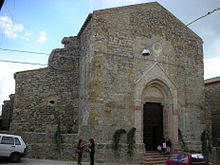Home - In and around
MOTHER CHURCH OF SAN LORENZO PATRON SAINT OF AIDONE
Mother Church of San Lorenzo patron saint of Aidone
It is perhaps the oldest church of Aidone, founded in the 11th century, according to Filippo Cordova and Gioacchino Mazzola on an ancient building from the seventh century. As it has been recently seen by some foundation walls within the Sacristy.
This Matrix Church after the great damage suffered in the earthquake of 1693 was rebuilt: the original Norman implant remains the lateral buttresses and the portal. With the reconstruction were added the side chapels and the bell tower, never completed. Traces of the ancient structure are visible in the large quill walls discovered in the sacristy, at the apsidal area.
The fašade was rebuilt using ancient material: the two grooves were reclaimed to one side of the door, representing the palm and barrel measurements, but not the ancient inscription whose fragments are scattered throughout the facade. Interesting are the impressions of the imposing cantons finished with spiral shapes.
Inside there are furnishings, sacred furnishings, antique parquets, statues and canvases in part from the convent of St. Catherine: among these objects, the relics of silver arm, containing the relics of San Lorenzo, probably carried by Rome from Marcantonio V husband of Isabella Gioieni, the latter of the family of Gioieni who had introduced the cult of the saint for a supposed miracle.
There are two versions of why St. Lorenzo, according to the family of Gioieni, would have been declared patron of the country instead of Saint Leone: one of them was Giantmason Gioieni in 1531 to introduce the veneration for the holy martyr in thanksgiving for salvation Of his son Lorenzo by the plague. According to another version was Isabella Gioieni, in the second half of the seventeenth century: married to Marco Antonio Colonna, to whom he had brought Aidone's fief to dowry, could not have children and promised to the saint to become patron of Country if he gave birth to a son; Grace would be granted and Isabella gave birth to his son Lorenzo and kept his promise. In 1810, however, the birth of the Academy of St. Lawrence dates back to at least a century.
Source wikipedia
It is perhaps the oldest church of Aidone, founded in the 11th century, according to Filippo Cordova and Gioacchino Mazzola on an ancient building from the seventh century. As it has been recently seen by some foundation walls within the Sacristy.
This Matrix Church after the great damage suffered in the earthquake of 1693 was rebuilt: the original Norman implant remains the lateral buttresses and the portal. With the reconstruction were added the side chapels and the bell tower, never completed. Traces of the ancient structure are visible in the large quill walls discovered in the sacristy, at the apsidal area.
The fašade was rebuilt using ancient material: the two grooves were reclaimed to one side of the door, representing the palm and barrel measurements, but not the ancient inscription whose fragments are scattered throughout the facade. Interesting are the impressions of the imposing cantons finished with spiral shapes.
Inside there are furnishings, sacred furnishings, antique parquets, statues and canvases in part from the convent of St. Catherine: among these objects, the relics of silver arm, containing the relics of San Lorenzo, probably carried by Rome from Marcantonio V husband of Isabella Gioieni, the latter of the family of Gioieni who had introduced the cult of the saint for a supposed miracle.
There are two versions of why St. Lorenzo, according to the family of Gioieni, would have been declared patron of the country instead of Saint Leone: one of them was Giantmason Gioieni in 1531 to introduce the veneration for the holy martyr in thanksgiving for salvation Of his son Lorenzo by the plague. According to another version was Isabella Gioieni, in the second half of the seventeenth century: married to Marco Antonio Colonna, to whom he had brought Aidone's fief to dowry, could not have children and promised to the saint to become patron of Country if he gave birth to a son; Grace would be granted and Isabella gave birth to his son Lorenzo and kept his promise. In 1810, however, the birth of the Academy of St. Lawrence dates back to at least a century.
Source wikipedia



